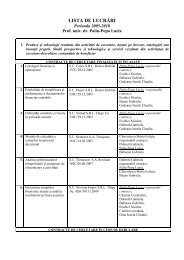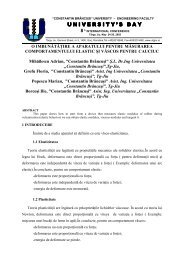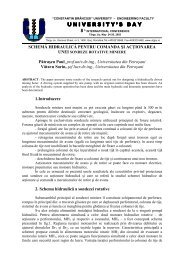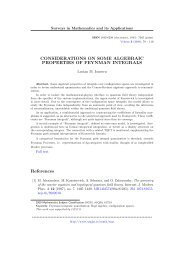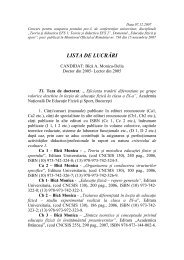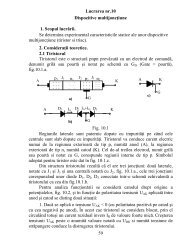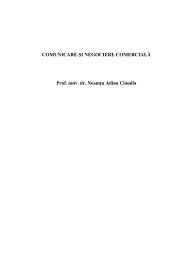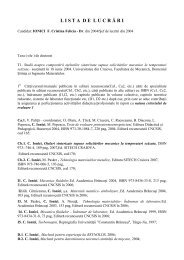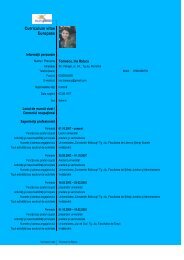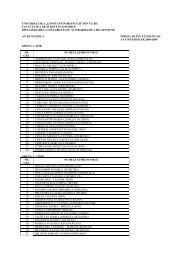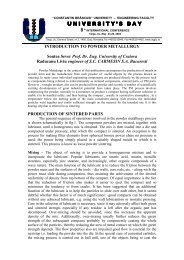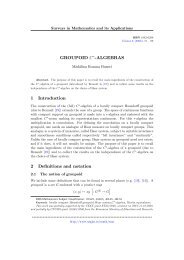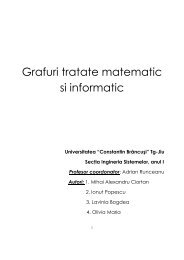NO. 2 / 2008 - Universitatea "Constantin BrâncuÅi"
NO. 2 / 2008 - Universitatea "Constantin BrâncuÅi"
NO. 2 / 2008 - Universitatea "Constantin BrâncuÅi"
Create successful ePaper yourself
Turn your PDF publications into a flip-book with our unique Google optimized e-Paper software.
Analele Universităţii “<strong>Constantin</strong> Brâncuşi” din Târgu Jiu, Seria Litere şi Ştiinţe Sociale, Nr. 2/<strong>2008</strong>acestei teze din moment ce a fost dezbătutăîn altă parte; 2 numai o reamintire aconcluziilor sale va fi suficientă aici.Principala preocupare nu trebuie să fieexplicarea bogăţiei pimaginii propuse nouă.Pe de o parte, trebuie să distingemcerinţele raţionale de coerenţă şi consistenţăde la cerinţele empirice de aplicabilitate şiadecvare.Cerinţa „consistenţei logice” sereferă la „exemplificarea noţiunilor logicegenerale în situaţii specifice, şi principiilede inferenţă” (PR 3). Se referă desigur lasofisticarea lui Aristotel a logiciisubstanţiale a bunului simţ, stabilizat încâtsă vorbim de Investigarea Legilor Gândiriilui Boole(1854) în termeni de principiu deidentitate, principiu de contradicţie şimijloc exclus. În limbaj comun, contradicţiadintre categorii trebuie evitată.Cerinţa de „coerenţă” caută săstabilească o democraţie categorică în carefiecare categorie are o anumită greutate(independenţă) şi are sens numai în armoniecu altele (interdependenţă). Cu alte cuvinte,fiecare categorie trebuie să aducă cevaspecific în discuţie fără a rupe legăturilesemantice cu alte categorii. Fiecare trebuiesă oglindească în felul său prezenţacelorlalte. Principalul vinovat pe careWhitehead îl denunţă contant este Descartesşi dualismul sau bi-substanţialismul săutotal incoerent.Cerinţa de „aplicabilitate”corespunde unei anumite puteri realeinterpretative. Nu este, cu alte cuvinte,nevoie să se realizeze sisteme totalconsistente dacă nu au putere explicativă devreun fel.Cerinţa de adecvare” solicită ca„toate de care suntem conştienţi, ca bucurie,percepţie, dorit sau gândit, trebuie să aibăcaracteristica unei scheme generale.” (PR3). Reprezintă, desigur, un ideal, un focusimaginarius dar în niciun fel nu esteinofensivă: empirismul radical se prevedeprin ea.Pe de altă parte, trebuie să articulămpatru criterii. În primul rând, respectiv launfolded elsewhere; 14 only a short reminderof its conclusions will suffice here. Themain concern should be not to explain awaythe richness of the picture proposed to us.On the one hand, we need todistinguish the rational requirements ofcoherence and consistency from theempirical requirements of applicability andadequacy.The requirement of “logicalconsistency” amounts to “theexemplification of general logical notionsin specific instances, and the principles ofinference” (PR 3). It obviously refers toAristotle’s sophistication of thesubstantialistic logic of common-sense,stabilized so to speak by Boole’sInvestigation of the Laws of Thought (1854)in terms of the principle of identity, theprinciple of contradiction and the excludedmiddle. In plain language, contradictionamongst categories is to be avoided.The requirement of “coherence”seeks to establish a categoreal democracy inwhich each category has some genuineweight (independence) and makes senseonly in its togetherness with the others(interdependence). In other words, eachcategory has to bring something specific inthe discussion without breaking its semantictights with other categories. Each has tomirror in its own way the presence of theothers. The chief culprit that Whiteheadconstantly denounces is Descartes and histotally incoherent substance dualism or bisubstantialism.The requirement of “applicability”corresponds to the request for some realinterpretative power. There is, in otherwords, no need to build fully coherent andtotally consistent systems if they have noconcrete explanatory power whatsoever.The requirement of “adequacy” asksthat “everything of which we are conscious,as enjoyed, perceived, willed, or thought,shall have the character of a particularinstance of the general scheme.” (PR 3) Itobviously constitutes an ideal, a focusimaginarius but it is by no means anAnnals of the „<strong>Constantin</strong> Brâncuşi” University of Târgu Jiu, Series Letters and Social Sciences, No. 2/<strong>2008</strong>40



